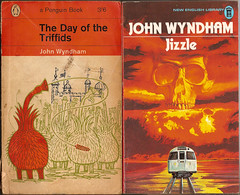literary links (revised)
 Sun, July 8, 2007 at 16:50
Sun, July 8, 2007 at 16:50 A short story by Herman Melville: Bartleby, the Scrivener: A Story of Wall Street - is it simply absurd? Wikipedia describes the plot, so better read the thing first: the story can be downloaded from Project Gutenberg.
 Henry James: The Lesson of the Master. Short but massive.
Henry James: The Lesson of the Master. Short but massive.
Guardian Unlimited Books of the Year 2006 chosen by various critics and writers like Billy Bragg and Simon Callow.
Acquired: The London Collection. Packed with facts. Good fun. Keep in the loo to weigh down those old copies of Fortean Times and keep the splashes off your Schulz and Schott's.
Joanne Harris has written a childrens' book called Runemarks about "Norse gods at the end of the world".
Nigel Hamilton in his Biography: A Brief History calls Woolf's 'Orlando' "a spoof biography of Vita Sackville-West", which it is.
Still available: The Planet Suite by my old school chum Allen Ashley. Also don't miss his 'Urban Fantastic' and 'Somnambulists'. OhMyNews recently published an interview with Allen: Writing, Perseverance and Shaggy Dog Stories.
Mike Moorcock has a story in Kiss the Sky: Fiction & Poetry Starring Jimi Hendrix edited by Richard Peabody. I think the story was in a Hawkwind tour programme thirty years ago.
The music of science is Michael Moorcock's review of graphic novel 'Horace Dorlan' which, unlike its two predecessors, has some text. It sounds remarkable. Watchman meets Kafka.
'Nova Swing' by M John Harrison; Gollancz, £16.99, reviewed by Brian McCluskey.
Design: Envisioning Information by Edward Tufte. 3D into 2D.
Vampires meet modern TV: Fangland by John Marks.
In the Spectator, Matthew d'Ancona suggests that Prime Minister Gordon Brown's new book Courage: Eight Portraits is a suitable "page-turner" for the beach on your holiday. Not me, I'm going to Iceland. He also says the book provides a ninth portrait of Gordon himself. Sounds interesting.
The Open Library aims to include every book "our planet’s cultural legacy" and make them all available on the interwebnet.
SciFaiku, er, science fiction haikus.
NPR: Under the Radar: Books Not to Miss.
The official blog of Penguin Books UK: The Penguin Blog.
At last! Leading from the front page - six feminist magazines launch in the UK.
...when they launched their first issue last summer she had become particularly aware of a "massive wave of crap women's magazines. We thought we probably had something more interesting to say." Although the magazine didn't start out as a feminist project, it quickly became one - a natural result of trying to create a publication for women that didn't follow the usual mould.
Geek to Live: Turn your blog into a book, part II.
Something for all bloggers to aspire to, ha ha The world's longest diary.
The Biggest Geek and the SF List is one reader's list of significant genre novels. I disagree with most of it but the comments below are interesting.
English lessons via podcast from the Grammar Girl "a quick and dirty success". Librarian chic.
Guardian Unlimited Books. Book blogs at The Guardian.
Free books! Digital ones. eBooks from Adobe. They seem to be quite legible on-screen.
Semantic Soup is a Flickr group devoted to recording misuse of the English language.
 JVK |
JVK |  Post a Comment |
Post a Comment | 

